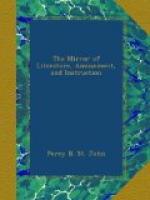“We ought to record that it was enlivened by many bowls of punch brewed by Hogg in Burns’ bowl, and in general very kindly and socially helped into the many glasses sent up for it by Lord Mahon: there was also some beautiful singing by Broadhurst, Wilson, Templeton, and Messrs. Jolly, Stansbury, Chapman, and other vocalists. The Shepherd, too, treated us with an original song, the burden of which was ‘Robin’s awa.’ It is a lament for Burns as the best of the minstrels; but it was brought in by a laugh, in consequence of the toast-master calling for silence for a song from Mr. Shepherd.”
By the Gazette report we conclude the Festival must have ended as many such meetings do; and never better expressed than by Lord Byron in his facete moments—“then talky, then argumentative, then disputatious, then unintelligible, then altogethery, then inarticulate, and then”—but we have done.
There is some talk of an annual national meeting on this day among the parties with whom this “Festival” originated: but we think others will say it were better to leave ill-done alone, lest it become worse. Probably the next “Noctes” of Blackwood’s Magazine will set the matter at rest by giving the world the only true and faithful account of this memorable meeting.
* * * * *
RETROSPECTIVE GLEANINGS.
LACONIC JUSTICE.
Over the door of the town-hall, in Zante, one of the Greek Islands (the better to instruct the magistrates in their public duty) these verses are inscribed:—




